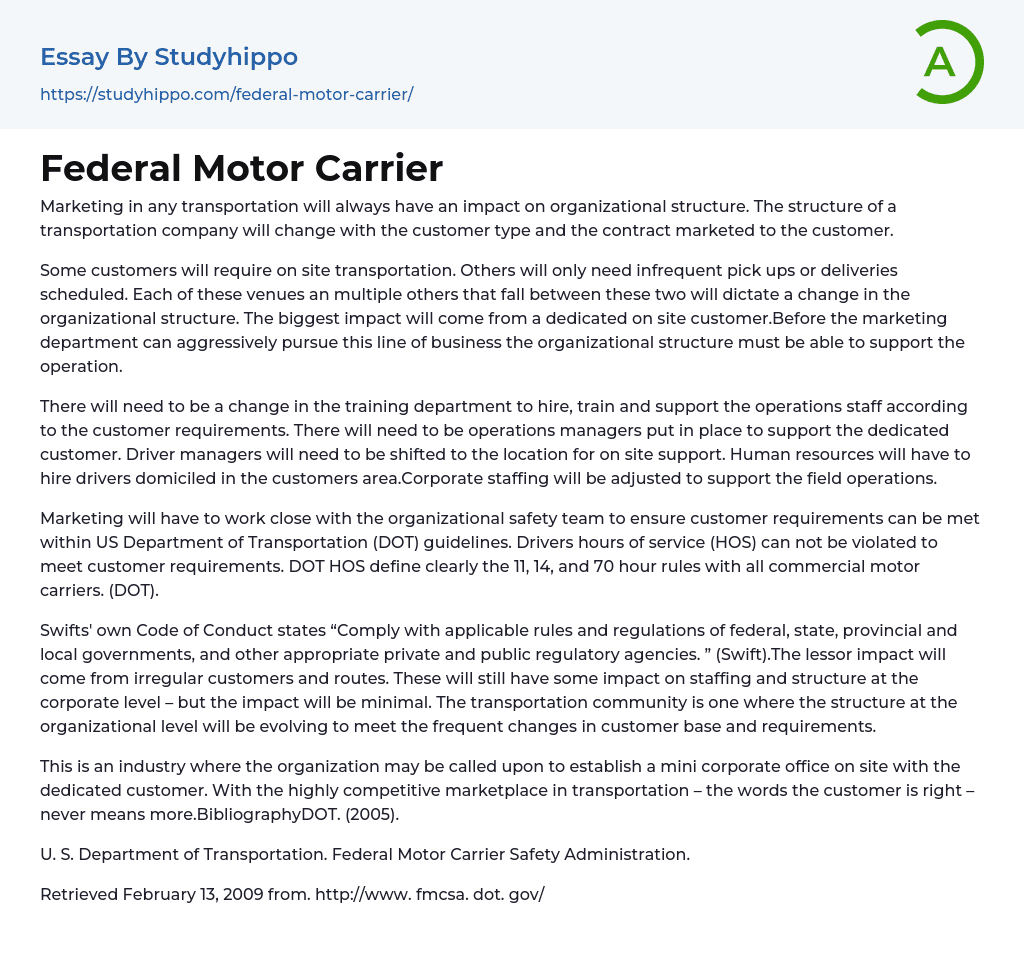Organizational structure is always affected by marketing in the transportation industry. The type of customer and contract being marketed will determine the changes that occur within a transportation company's structure.
Depending on their needs, customers may require either on-site transportation or sporadic pick-ups and deliveries. The organizational structure must adapt to accommodate these and other scenarios that fall between the two. A dedicated on-site customer will have the greatest impact, but the marketing department cannot aggressively pursue this line of business without ensuring that the organizational structure is equipped to support it.
The training department must make changes to hire, train and support operations staff based on customer demands. Operations managers should be available to provide focused customer support, and driver managers should be relocated for on-site assistance. Human resources should recruit driv
...ers residing in the customer's area, and corporate staffing should be tailored to aid field operations.
Marketing and the organizational safety team must collaborate closely to fulfill customer needs while complying with the guidelines established by the US Department of Transportation (DOT). It is paramount to adhere to the DOT Hours of Service (HOS) regulations in order to avoid violating drivers' work hours. These regulations clearly establish the 11, 14, and 70 hour rules that are applicable to all commercial motor carriers under the DOT's jurisdiction.
Swift's Code of Conduct emphasizes the importance of adhering to the rules and regulations set by governing bodies, both public and private. While irregular customers and routes may still have a small impact on staffing and corporate structure, the transportation industry is constantly evolving to meet the changing needs of its customer base.
In the transportation industry, it i
not uncommon for organizations to set up a small corporate office on location to serve their dedicated customers. In this fiercely competitive market, the customer's satisfaction always takes precedence.
Source: DOT. (2005).
The Federal Motor Carrier Safety Administration is a division of the U.S. Department of Transportation.
On February 13, 2009, the source http://www.fmcsa.dot.gov/rules-regulations/topics/hos/hos-2005 was retrieved.
The Swift Transportation Corporation's culture is top-notch and evident in all departments, according to their website "About Us" section (Swift, 2009). The source was accessed on February 13, 2009. The original text was enclosed in a paragraph tag.
- Auction essays
- Balanced Scorecard essays
- Business Plans essays
- Expense essays
- Income essays
- Net Income essays
- Security Guard essays
- Singapore Airlines essays
- Battle essays
- Intranet essays
- Maintenance essays
- Simulation essays
- Inn essays
- Federal government essays
- Armed Forces essays
- Confederate States Of America essays
- Federal Government Of The United States essays
- Fourteenth Amendment To The United States Constitution essays
- Governance essays
- Parliament essays
- Politics essays
- Jurisdiction essays
- Bureaucracy essays
- Separation Of Powers essays
- Congress essays
- President essays
- United States Congress essays
- Non-Commissioned Officer essays
- Appeal essays
- Revenge essays
- Corporate Governance essays
- Public Service essays
- Income Tax essays
- Supply essays
- Red Cross essays
- Democracy essays
- State essays
- Liberty essays
- Absolutism essays
- Reform essays
- Republic essays
- John Marshall essays
- Bourgeoisie essays
- Developed Country essays
- Elections essays
- International Relations essays
- Left-Wing Politics essays
- Monarchy essays
- Political Corruption essays
- Political Party essays




